Seven years of reading with Children at Ameneh Nursery
Conversation with the staff involved in implementing book reading in Ameneh Nursery and the influence of the “Read with Me” program on children.
Seven years ago, children from the Ameneh Nursery were visiting the Children’s Cultural Museum in Negarestan Garden, their silence and inability to express their needs and feelings sounded a serious and alarming problem. They had poor oral skills and a limited range of vocabulary. In nurseries, such as Ameneh, insufficient attention, lack of language communication and interaction has cast an overwhelming shadow on the children. Due to these deprivations, they exhibit odd behaviors that are interpreted as Psychosomatic disorders, therefore, the ‘Read with Me’ experts and staff decided to implement their reading program and activities in Ameneh Nursery.
In 2013, Azadeh Sadeghi, a ‘Read with Me’ expert, using quality books for children and “Learning Phonological Awareness” packages started teaching at this center. She realized that the children’s unfamiliarity with books, lack of concentration, and no experience in listening to stories, made progress very difficult. She decided to implant the seeds and love for book reading from birth. In 2014 Miss Sadeghi, officially, initiated the newborn section in Ameneh Nursery and the ‘Read with Me’ program expanded in this center.
In a conversation in 2015 with the staff at Ameneh Nursery, the incredible effects of the ‘Read with Me’ program in developing children’s abilities and skills was discussed – the entire dialogue is available in this report. This year, Miss Sadeghi, again discussed the outcome of the ‘Read with Me’ program with the nursery staff, to have their opinion and attend to the existing issues. At the beginning, most of the authorities at the Nursery were unaware of the need and advantages of reading to newborn babies and toddlers. Gradually, with Miss Sadeghi’s continuous activities, they realized its efficacy, became more cooperative, and helped toward implementing the reading program.
Miss Jaberi, director of Ameneh, who was previously at Shabier Nursery, says at Ameneh children are clearly different to those at other centers, they exhibit age-appropriate behavior.
‘’Their actions, requests, ideas, and social interactions are relaxed, and they can easily express their needs – all these traits are achievements of the ‘Read with Me’ program. The behavioral transformation of these children is evident when they are transferred to other centers, or when they are compared to other children.”
Miss Jaberi believes that the continuity and discipline exercised in implementation of the program are important in its effectiveness and success. “the children may not be able to fully express their feelings, but they are quite aware of who values and respects them, and they are aware of the programs arranged for them. Because of their mental anxiety, it is very Important to tell these traumatized children about their daily activities, first thing in the morning. Consequently, children will have trust and confidence in their caregivers and other people.
The effects and influence of the ‘Read with Me’ program on these children is immense, far-reaching, and impacts different aspects of their lives. The remarkable effects are seen in the toddler’s section, who were exposed to book reading from birth. Miss Bagheri, the psychotherapist at Ameneh, says “Previously, we had very anxious and stressed children, who at the age of 4 to 5 had no perception of reading and didn’t even know how to turn a page in a book. When we gave them a book to look at the pictures or turn the pages, they would tear it up and throw it in the trash can. Since you started the reading program, the children in the same section of the nursery learned how to look at the pictures and turn over the pages of a book. One and-a- half to two- year- old babies upon entering the toddlers section were calm, quiet, and more disciplined – traits that did not exist before. They listened to caregivers, knew that borrowed books or other things should be returned on time and if they had not finished reading a book, they should place it back on the bookshelf. These changes were so evident that when they return from an outing, they would neatly place their shoes in the proper place. Book reading is very important for their tranquility and relaxation. Children who have been read to long for their turn again. In the past, if they shouted, now they are considerate and wait for their turn. On occasions, I have noticed that when you told them tomorrow you are taking them to the library, instead of complaining or banging their heads on the wall insisting they must go right now, they would get ready to go the next day.”
In many cases, teaching “Phonemic Awareness” packages and continuous book reading has made speech therapy and Psychotherapy unnecessary for these children. The staff at Ameneh Nursery believe that meaningful choice of quality books with concepts dealing with the desires, needs, understanding, and children’s rights, have therapeutic benefits. Miss Vakili, the occupational therapist, in Ameneh Nursery says” Book reading can be complimentary to other activities; it can be defined as a therapeutic plan. Thirteen years ago, when I came to Ameneh, the children had an autistic behavior. They had no eye contact, banged their heads on walls, had delayed speech and exhibited odd cliche behavior. But the children you exposed to book reading from birth who are now three to four years old do not show abnormal behavior. The conditions have not changed much, the caregivers are the same, the atmosphere is as before, only book reading has been introduced into their lives. During the Covid19 period, we had no speech therapy, and book reading has had a profound effect on the children’s wellbeing. For example, you read books for a child born with Crouzon syndrome, even though, he had no speech therapy, his condition improved so much that he was transferred from the rehab center to the center with normal children.
Miss Bagheri talks about the long-lasting impact on children who were thought to be
mentally retarded and were to be transferred to special centers. She believes and says “All children realize the special attention, respect, unconditional love in book reading. Even a child with ‘Down Syndrome’, who loved book reading very much did not go to the library until it was his turn. Why? Because he knew you woud live up to your promise and take him to the library when his turn came up.” Some of the children who come to Ameneh Nursery have suffered serious mental traumas. Book reading and being in a library is a refuge to mitigate their stress. Miss Bagheri recounts the attachment of one child who had gone through a lot of traumas came to the library, loved it so much that he wouldn’t leave the place. Because before his painful experience, he had a library at home which brought back good memories. Reminiscing pleasant events helps him not to think about unhappy moments. Since you started reading books for him, he does not repeatedly talk about his bad experiences. He always brings a book and enjoys reading it with you, and we can continue this strategy for his treatment.
The effects and influence of book reading in the nursery is not limited to children with special needs. All the children at these centers have, in some way, experienced traumas, and their life is profoundly different to other children. Children, in the outside world, for the first months and years of their existence become acquainted and connected with simple daily life concepts, but the monotonous, routine, and restricted life in a nursery does not create the time and circumstances for such valuable learning moments. This fact enhances the importance of book reading for them. It broadens their understanding and opens windows into the world beyond the nursery. Miss Bagheri, in connection with this phenomenon says” Once I asked a child to read me a story from one of the books, as he was saying something, he said” this is his father, he is playing with him.’’ I always thought because young children in the nursery do not have much contact with men, they do not appreciate the true sense and feeling of having a father. Sometimes, a child would say ‘’ someone got into the car’’, while they had never seen a car before. By reading books children become familiar with the concepts of father, mother, sister, going out, going to school, things that do not exist in nurseries. Miss Sabri, teacher in the toddler’s section, regards familiarity of the children with different subjects an outstanding feature of reading books for them.” These children have no contact with the outside world, for example, they don’t know what a bus is, who is a driver, but by seeing pictures in books they get to know them, and when they are watching the tv they hear these words, and they remember seeing them in their books.
Another characteristic of nursery-children is that they have no notion of what independence and personal privacy is. Staff at the nursery believe that their low self-esteem and lack of confidence causes many issues in adulthood. Miss Bagheri says,’’ If a child does not learn about privacy and what belongs to him, he won’t appreciate the limitations as an adult, therefore, he is likely to allow others to violate his privacy, or he might not recognize other peoples’ privacy and disregard them. The mere fact that you allow him to choose a book he likes to read, conveys the message that’’ you are an independent individual and have the ability to choose for yourself.’’ He will learn to have confidence, and if others want to force him against his will, he knows, he can say no to them.
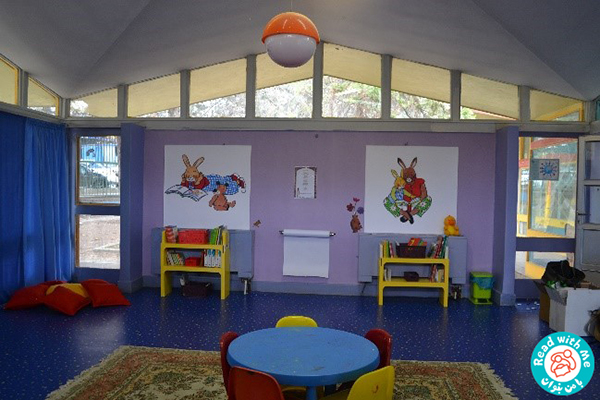
Children in Ameneh who are in the library themselves, or books are read to them, gain a new experience: devoting special time to them. Miss Bagheri believes “Book reading to children conveys the message that ‘You are important, we care for you’, self- esteem is a basic human need. During the week when you take children to the library, and you tell them ‘today was your turn’, it means this time is set aside especially for you.
Recognition and expression of excitement and emotions are vital interactive skills, qualities that children in nurseries such as Ameneh are weak in. Continuous execution of the ‘Read with Me’ program in this center and children’s proximity to books helps to develop these skills. Miss Vakili believes “Children are aware of their own emotions and express them appropriately. Before the reading program, older children bullied and beat younger ones, banging heads was frequent, repeated bed-wetting was prevalent, but now they talk and bring up their problems. Their stress and anxiety have decreased, they appreciate feelings and emotions and when a caregiver upsets them, they complain – all these traits are incomparable to the past. Now, if they really like somebody, they show their feelings and emotions and say” I love you’’, but to strangers and less familiar people, they don’t use this expression. Clingy behavior in children with slight mental retardation, a way to attract attention, is not seen any more.
Related to this behavior, Miss Bagheri recounts an incident about a five-year-old mentally retarded child with speech impediment and says’’ In the past as soon as people, even strangers, entered the nursery, the children would cling onto to them and put hands into their pockets. Because this child had been exposed to book reading from birth, he just says “I love you”, but does not show any affection for strangers. He has empathy and understanding toward his caregivers and is very collaborative. He has been on the rehab transfer list for years. But now, I, as the Psychotherapist in Ameneh, and Miss Vakili as the occupation therapist, are no longer willing to send him to that center. If you respect him, and speak softly with a friendly tone, he is very cooperative. He helps bathe the children, cleans the kitchen after meals, and is supportive in many ways. He is fully aware of circumstances around him and has the ability to predict the consequences of his actions.”
The reliability performance and achievements of the ‘Read with Me’ in Ameneh Nursery is due to perseverance of the staff in implementing the program. Unfortunately, the Corona pandemic caused a long hiatus in the execution of our activities, and loss of precious time in reading and communicating with children. Volunteers are not allowed to enter the nursery, and the small number of teachers cannot cope with the workload, there is no time for reading. All the staff at Ameneh mention the restlessness of toddlers who suddenly have been deprived of going to the library. But a more serious issue is that of newborn babies who are going through the same conditions of newborns five years ago, before the execution of the ‘Read with Me’ program. Without volunteers to hug the babies, to talk or read books for them; most of the time, they just stare at a blank ceiling. Miss Vakili explains the existing situation and says ‘’When you don’t speak to a child, don’t expect him to talk, when you don’t stimulate his hearing sense don’t expect him to listen to you. During the Corona pandemic, our newborn babies are deprived of these advantages, and when they come to the toddlers’ ward or become available for adoption, we must not have the same expectation as children who have experienced book reading.
Miss Bagehri talks of another concern “Being left alone has many consequences. Children express their desires by crying, this is their primary weapon. But, after some time, he realizes no matter how much he cries or asks for something, nobody will pay attention to his demands – this condition is known as ‘learned helplessness’. It means the child does not try to alter his condition.” She continues to talk about the child with ‘Down Syndrome’, who has suffered the most from discontinuation of the program.” The few months that you were not able to come to the nursery to read for them has disrupted the children. This child has suffered more than the others, he has hurt himself and harmed other children. The library is a special environment for him.
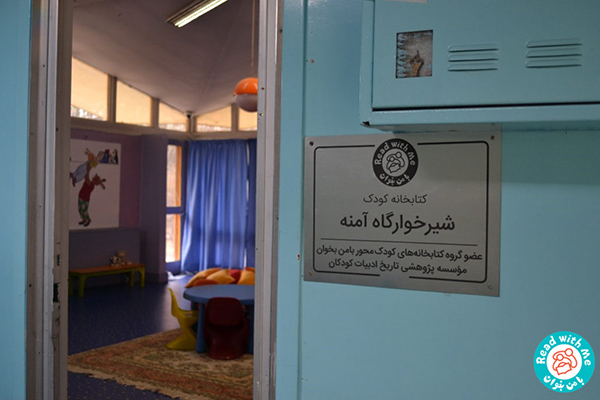
Other strategies to lessen the adverse effects of the Corona Pandemic have been considered – distributing thick card-board books in the toddler’s section, so that they would have access to books. Miss Enayati, director of the toddlers section, says’’ Unfortunately, we don’t have enough teachers. Most of their time is spent changing and feeding the children, and they have no time to read for them. We give books to children, but teachers cannot allocate any time for reading. Sometimes while working, they might just say ‘turn the page, don’t tear the book’, but that’s all, nothing compared to your interesting way of reading a book for them, yet it still is effective. The children look at pictures in the books, and sometimes may have a short conversation with caregivers, for instance, the child says: look at the little chick and the caregiver says: you mean the rabbit? and the word stays in his mind. The presence of books encourages caregivers to talk to children and give explanations. Even children, themselves, show and point to pictures and want caregivers to talk about them. Sometimes they say the words, and the caregiver unconsciously repeats the words.
In circumstances when book reading was not possible, another strategy suggested to keep children connected to books was to install sound systems in the newborn section and play stories on loud- speakers. Miss Moradkhani, Head of the Children’s Nursery, helping to carry out this program says “If children are not tired and only go to bed because their caregiver insists, instead of going to bed at eight or nine, we play a story for them. The quiet and soothing voice of the narrator and the background sound of singing birds and running rivers… helps them to go to a restful sleep and it also has the benefits of book reading.” She also mentioned that the stories and music may distract caregivers during aspirations or children coughing. Considering these factors, we decided to carry out these activities in the newborn section while caregivers are present in the ward and can pay full attention to the children. Misses Soleimani, Mesbah, and Rahmani, caregivers in the newborn section, while expressing their concern about the absence of book reading during the Corona pandemic, talked about their attempts to enhance and develop the mental and language skills of the children.’’ Due to the enormous amount of work, we cannot devote our time to book reading activities, but while we are working with the children, we sing songs, tell stories, and constantly talk with them. Unfortunately, wearing masks has made it rather difficult for us. Considering the eagerness and enthusiasm of the caregivers in Ameneh Nursery, who are now aware of the importance of book reading, Miss Sadeghi has decided to give them simple instructions to create conditions so that their activities can be more effective and meaningful. For example, the caregiver for the newborn babies sings nursery rhymes and talks about colors or facial features, while in the next room older babies listen to more advanced talk and hear songs. Therefore, by hearing words about colors, the face, and…. upon entering the toddlers section, they are mentally equipped to learn things easier.
The Corona pandemic has lessened the effects of the ‘Read with Me’ Program, but from Autumn 2020, activities in Ameneh libraries has increased very much. Children aged 18 months to 4 years old, come to the library at designated times. In the Fall season, 30 children spent relaxed, carefree moments in the library sitting in chairs, reading any book they wanted, and finally tidying the library by putting the books back in the shelves. And they realized that they are appreciated, loved, and respected.
Library is an environment brimming with knowledge. Even posters talk, tell stories, and invite children to communicate. On a carpet, or a chair, they sit– turn pages, look at pictures, and listen to stories. Being in the library, children are close to nature. Looking out the window, they see the Sun, trees, fallen leaves, and rain drops – they talk and sing happy songs.
The end of the Corona pandemic is not uncertain. We hope by returning to normal days with the support from the staff at Ameneh we’ll get our sound systems ready, and volunteers with health safety precautions will join us to help our children spend more time in the library.
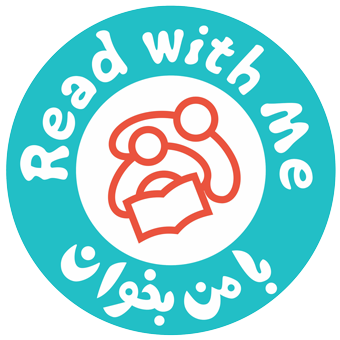
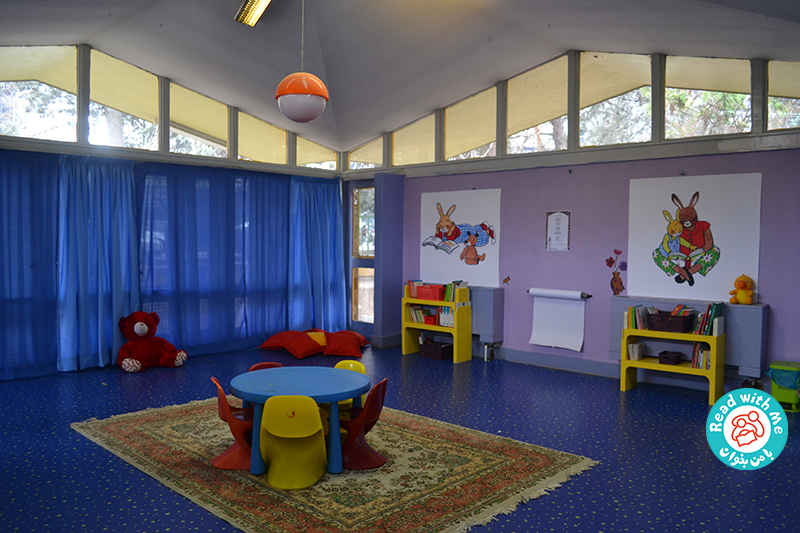

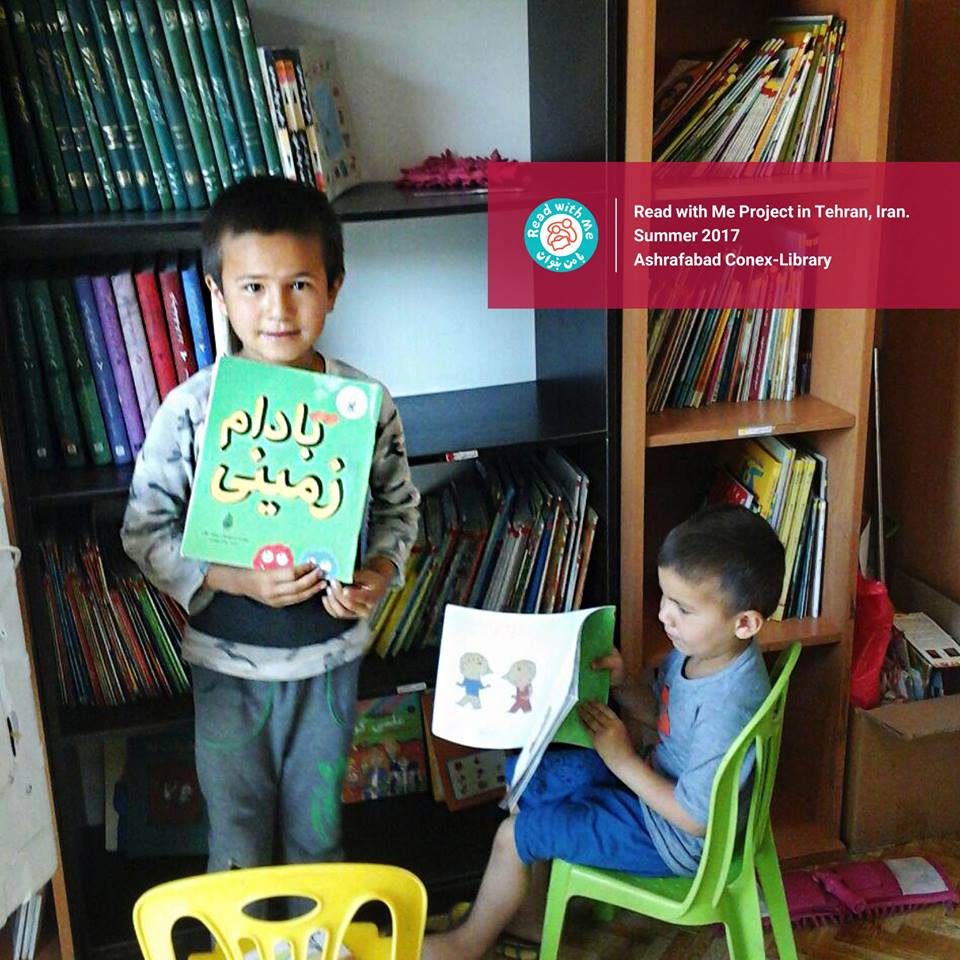

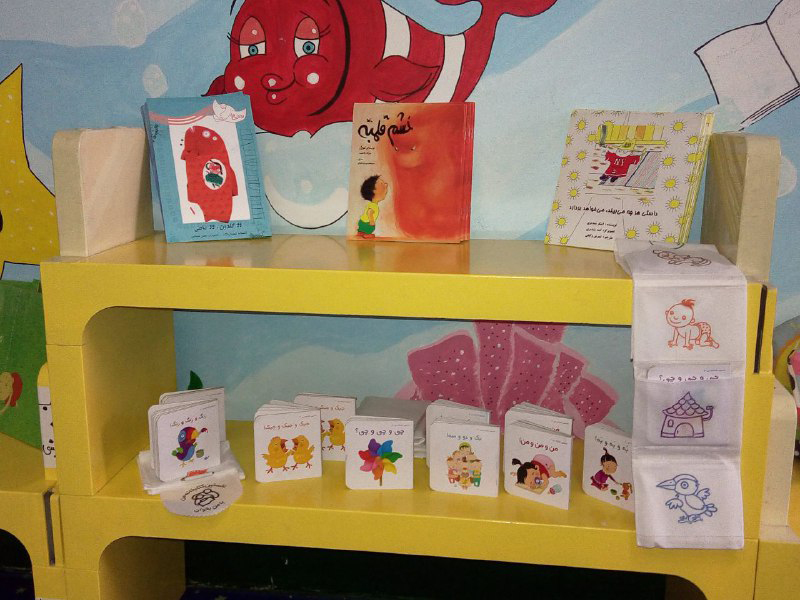
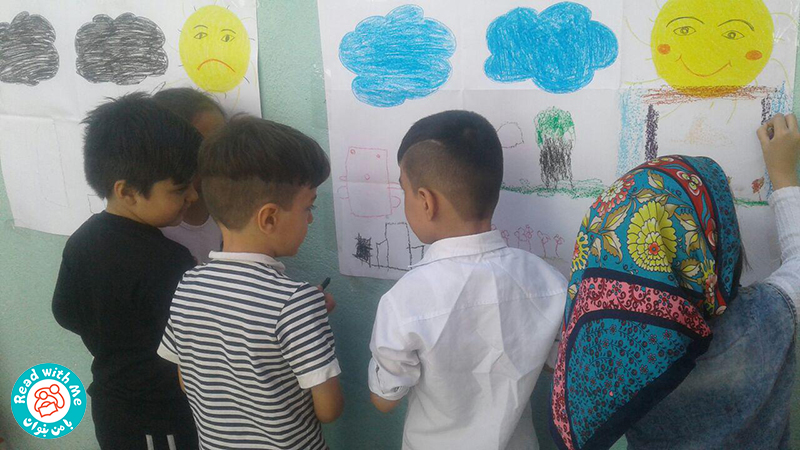
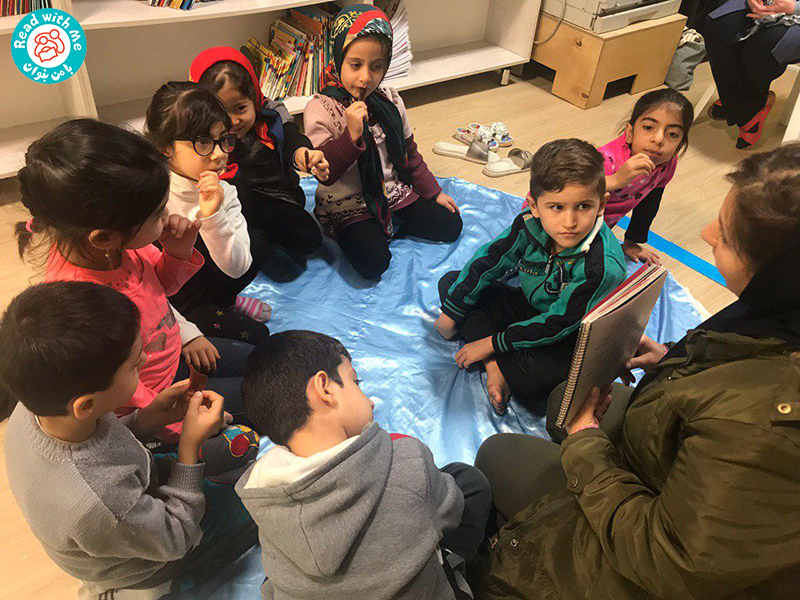
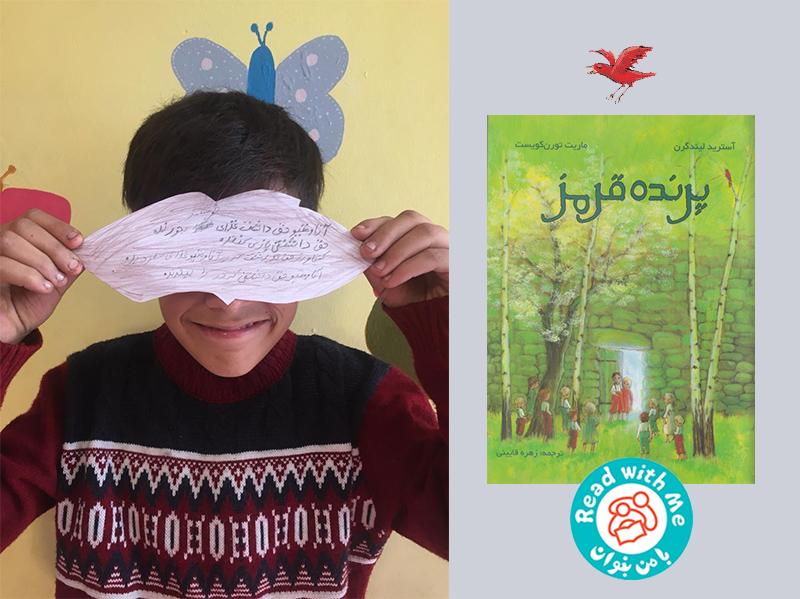
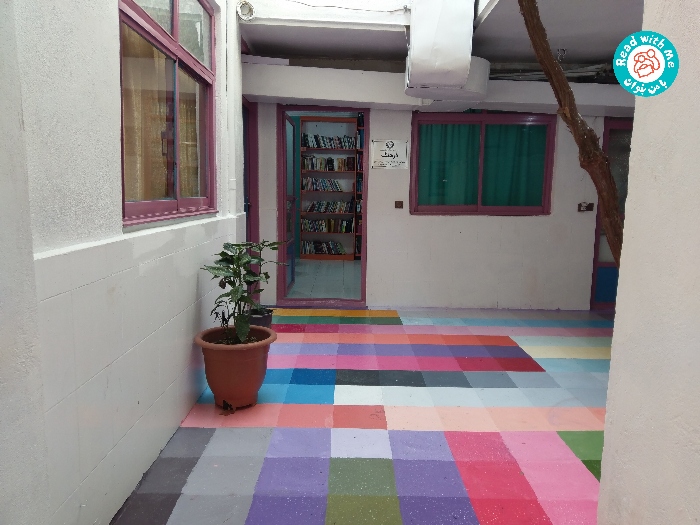


Leave a Reply
Want to join the discussion?Feel free to contribute!